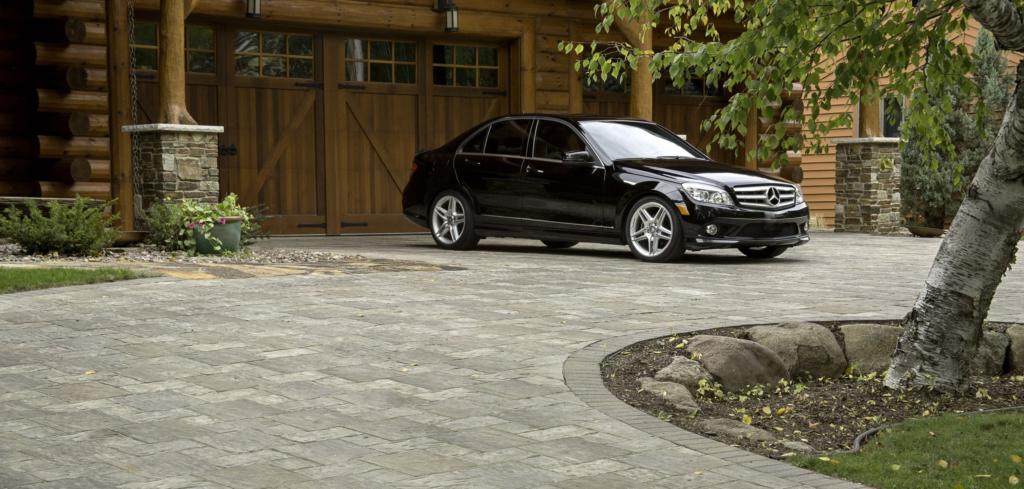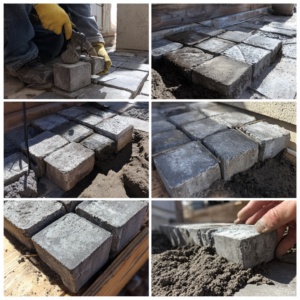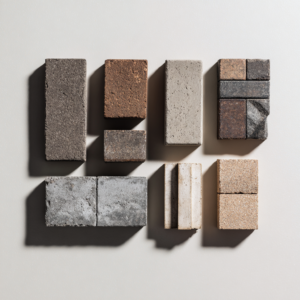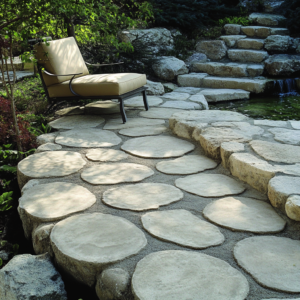When I first began working in hardscape design, I noticed how many homeowners ask about asphalt vs concrete paver driveway options. It is a question that reveals personal taste, climate concerns, budget, and long‑term expectations; so to settle this, today we’re going through real-performance comparisons I have seen in my years installing driveways. I want to talk about material behavior, maintenance demands, visual and structural differences, climate‑related choice points, and lifecycle economics.
You will come away understanding not only which driveway might suit your setting but also why it behaves the way it does and what tradeoffs you need to weigh!
You may also like: Are concrete pavers good for driveways?
Jump to:
Asphalt vs Concrete Paver Driveway

Asphalt Driveway
Asphalt driveways are constructed from a mixture of aggregates sand and petroleum binder that is laid hot and compacted.
Asphalt cures quicker than concrete – so you can usually drive on it within a day – but it does soften in hot weather and may become tacky under high temperatures, causing tire residue or surface deformation.
In cold climates, asphalt remains more flexible, resisting freeze‑thaw cracking better than rigid materials, but over time, it may develop alligator or crocodile cracking that requires seal coating roughly every three years to maintain surface integrity.
I always emphasize to homeowners that, although asphalt has a lower upfront cost, it carries a recurring maintenance cycle that influences its long-term wear.
Concrete Paver Driveway
Concrete paver driveways are made from individual interlocking units installed over a compacted base and bedding sand. Unlike poured concrete, they are not a monolithic slab but rather a flexible mosaic of pieces that distribute load and permit slight movement.
They resist cracking because each paver can shift and resettle slightly under pressure. In practice, I have replaced single damaged pavers many times without disturbing the entire surface which is a powerful advantage in repairability.
Pavers also offer aesthetic flexibility; you can install herringbone, running bond, or custom patterns, and add color or texture to match specific architectural styles.

Climate Impact
Climate plays a major role in choosing between asphalt and concrete pavers. In hot southern regions asphalt often becomes soft and sticky under sunlight damaging under heavy loads or from frequent stops.
By contrast concrete and pavers perform well in heat and rarely deform unless exposed to unusual heat sources. In cold climates, asphalt retains flexibility avoiding widespread cracking better than rigid concrete slabs, but interlocking concrete pavers excel in freeze‑thaw settings because they allow movement rather than resisting it rigidly.
Durability and Maintenance Differences
Asphalt typically lasts about 15 to 20 years with proper maintenance, although some installations reach up to 25-30 years. It requires seal coating every few years and patching of cracks or resurfacing if deterioration appears.
Concrete pavers can last up to 50 years or more, depending on the quality of base preparation and joint maintenance. Cleaning is simple just pressure washing and applying polymeric sand into joints periodically.
Damaged sections are easily replaced without replacing an entire driveway. Pavers tend to perform especially well in areas with heavy traffic or settlements because the interlocking system spreads weight evenly.
Aesthetic and Design Considerations
Visually, asphalt offers a uniform black surface which is functional but limited. Concrete pavers shine here because they come in many tones, shapes, and textures – thus allowing for an outdoor design that complements landscaping and architecture. I often guide clients through sample layouts so they can feel the textures and imagine the patterns.

A herringbone pattern, for example, resists narrowing movement under turning vehicles, whereas a running bond creates a clean linear aesthetic. You can also create curved edges or borders with contrasting tones adding definition and designer flair.
Cost Comparison and Life Cycle Value
Asphalt driveways tend to cost less per square foot than concrete pavers. Typical asphalt might range from 3 to 7 dollars per square foot initially, though it must be resealed frequently.
Concrete paver driveways cost more upfront perhaps 8 to 15 dollars per square foot depending on pattern complexity and base preparation, but they require far less maintenance and last significantly longer.

Think about it this way: when you compare total cost over 30 years, pavers often come out ahead because you avoid resurfacing and full‑depth repairs.
Installation Process Differences
Installing asphalt involves grading soil, laying a compacted base, and then spreading and compacting hot mix asphalt. It is quick-drying, so timing is important, but the entire driveway can be ready in a day.
By contrast, installing concrete pavers requires a multi‑layer foundation: an excavated base compacted with crushed aggregate bedding, sand layer edge restraints, and precise leveling. Joint sand is swept in, and compaction is completed with a plate compactor.
The process may take longer, but it ensures flexibility and proper drainage.
Environmental and Drainage Impacts
Asphalt surfaces are impervious so rainwater runs off creating runoff and sometimes pooling if drainage is inadequate. Concrete pavers can be permeable allowing rainwater to infiltrate through joints into aggregate base and soil below reducing runoff and filtering pollutants.
In urban areas, this helps manage stormwater naturally. I often suggest permeable paver designs where local codes require rainwater management or where water pooling is a concern.
Choosing the Right Driveway Material for You
When advising a homeowner I focus on how each material aligns with their climate aesthetic goals maintenance comfort and budget. If fast installation and lower initial cost are priorities and the climate is moderate asphalt may be appropriate.

If you value design flexibility, longevity, low-maintenance, and eco‑friendly drainage, pavers are usually the better choice. The question regarding asphalt vs concrete paver driveway is not just about material: it is about how that material will behave on your site over decades.
Asphalt can make sense for budget-focused needs or speedy installation, but the lifecycle tells another story.
If, after considering these factors, you’d like to explore design options or receive an estimate tailored to your property in Florida, feel free to reach out to us here at JS Brick. We would be glad to partner with you in crafting a driveway that suits your specific site style and expectations!



